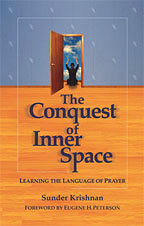
|
|
Foreword Any prayer is good enough to get us going in the life of prayer. One does well not to be too careful about the etiquette or protocol of prayer. God doesn’t grade the grammar of our prayers. But that doesn’t mean that anything goes. We all have a sound instinct to prayer, but instinct is not a reliable guide to a developing and maturing life of prayer. Prayer that relies on emotion and instinct and circumstance for its impetus and syntax, while not exactly inauthentic, is hopelessly stuck in immaturity. There is nothing reprehensible about being immature; but it is irresponsible to remain so. Falling to our knees or lifting our hands to heaven and saying “God” is always a good thing to do, but our souls require instruction and guidance if these spontaneous beginnings are to stay on track and avoid the many detours and dead ends of false teaching and ignorance introduced by our own sin. Praying has as many heresies at its disposal as thinking. We have a prayerbook bound into our Bibles, put there to train us in our prayers. That prayerbook is the Psalms. And we do well to be alert to it, apprenticing ourselves to these prayers, putting ourselves in a school that trains our souls in God. It is a school in which our prayers are stretched and deepened into the largeness of God. Sunder Krishnan is a faithful guide and master teacher for Christians who come together to pray. The unique element in this book is the attention he gives to the missionary dimension of prayer. He demonstrates that the Psalms insistently guide us into forms of prayer that are often neglected in our fragmented and ego-isolated culture, taking us out of ourselves, moving us from our home base, into the neighborhood, and finally into “all the world.” A generation of Christians that supposes that a daily hour or so with television or newspaper is the way to “keep up with” the world needs to know that many of us are convinced that prayer in Jesus’ name is the only effective way to get in touch with and deal responsibly – Christianly – with a world that is as large as God’s creation and salvation. Praying, because it is so intensely personal, is always in danger of becoming exclusively private – me-centered. Sunder Krishnan shows us how the psalmists, while never letting themselves be distracted from personally dealing with God, were, at the same time, constantly preoccupied with the others in the world who were not yet in on the revelation: the nations and peoples, the ends of the earth, the outsiders to God. Entering into and cultivating such prayer works two ways: it keeps our world mission activities informed by prayer and it keeps our prayers stretched into world mission. Prayer that begins in the closet, as it so often (and properly) does, ends up in concert and companionship with the angels in the cosmos. Eugene H. Peterson
|
